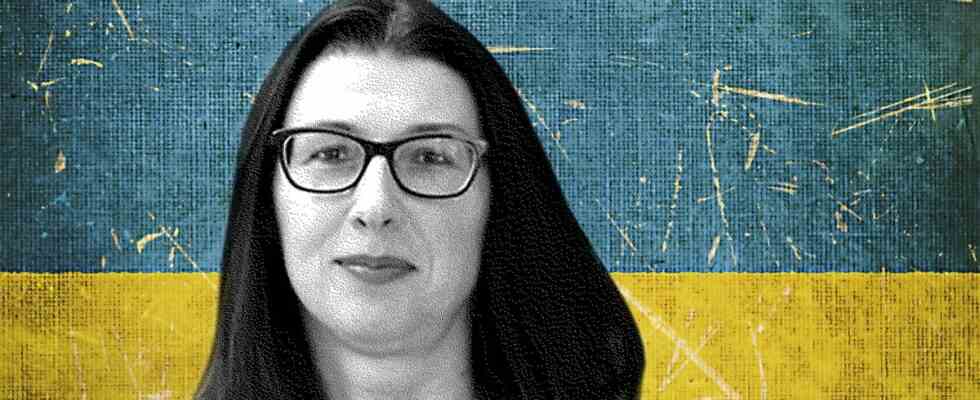At home I say, we’ll have more guests, from Mariupol. R. and her mother take an evacuation train from Dnipro to Lviv and then immediately on to Chernivtsi, they are there on March 25 at 8:10 p.m. We’ll pick them up in the car. On the way, my brother-in-law asks if what’s being said about Mariupol in the news is true. Yes, says the mother, the city is constantly being bombed, for many days there has been no electricity, no heating, no water, no gas, no telephone connection. The dead cannot be buried. She also had to collect rainwater, as drinking water is scarce in the city.
At home there is warm soup, then they talk again. They didn’t live together at the end of the day, and because there was no connection at all, they didn’t know anything about each other. The mother was taken to Dnipro in a car by acquaintances. She assumed that her daughter would be able to leave town sooner. R. and her friend stayed in the friend’s apartment. One day they set out on foot. The information about the humanitarian corridors was sparse and sometimes contradictory. All cars full, none stopped. So they march about ten kilometers on foot, passing several checkpoints – those of the Russians and those of the so-called “Police of the People’s Republic of Donetsk”. Everywhere they have to bare their arms and calves – it is checked whether there are any “Ukrainian-patriotic” tattoos or signs of carrying weapons. At a mass accommodation where they are staying for the night, they are asked to register with passport details, ostensibly in case relatives are looking for them. Otherwise they would have problems with the “Police of the People’s Republic of Donetsk”. They just manage to escape, thanks to the chaos and the crowds.
You have to wait in line for bread, but there are many sausages to buy – there is a meat factory in the town
Buying food on the go is almost impossible, the shops are closed or ransacked. In the town of Mangusch, a woman sells her household supplies right on the street – potatoes and preserves, the prices are about six times the “peace prices”. With a friend of the friend they can sleep for free. During the day they look for evacuation buses and actually find some – with Russian license plates. You turn back. Then they are very lucky: they accidentally discover a car with the sign “Volunteer” and are taken to Berdyansk. The city is occupied by Russians, but there are Ukrainian flags all over the city. The soldiers are very quiet here. You have to wait in line for bread, but there are many sausages to buy – there is a meat factory in the town. The friends find the assembly point from which Ukrainian evacuation buses depart. You sign up – for the 69th bus. The 24th is just leaving. Nobody knows how regularly and how many drive.
And then they are very lucky a second time: what has failed several times before, works. The international organization that R. works for finds a driver who is willing to drive the two friends and another employee to Zaporizhia. There is a fourth passenger: an 84-year-old man, a Georgian who has long called Ukraine his home. At a Russian checkpoint, he speaks to a soldier who apparently comes from the Caucasus. What is he looking for in Ukraine, he should be ashamed that he came to the independent country to murder. Thank goodness there is no escalation. The old man proudly explains to his passengers that his son is a general in the Ukrainian army. Maybe that’s true too, says R., because in some places the driver is guided by the son over the phone, and some streets should be avoided. Then finally a Ukrainian checkpoint. You did it.
Incidentally, R.’s school no longer exists. The mother saw a bomb fall on it
Only during the conversation do I realize that the war has driven the two of them out of their homes for the second time. You actually come from Alchevsk, the city is now in the occupied area, in the so-called “Luhansk People’s Republic”. In 2014 they went to Ukraine, says the mother. R. graduated from high school in Mariupol. Incidentally, R.’s school no longer exists. The mother saw a bomb fall on it: “It was dropped on the building very precisely, very accurately.” I am reminded at this moment of the words of Russian Foreign Minister Lavrov, who expressed it in a similar way. The targets in Ukraine are hit “delicately, very precisely”. From a linguistic point of view, there is probably an expansion of meaning.
R. went to Chernivtsi to study. I know more, R. studied administrative sciences, she took an active part in cultural life in Chernivtsi, right before the start of the pandemic she did an internship with us in the thought roof center, the contact was maintained. R. did her master’s degree in December last year, most of the studies took place online, she went back to Mariupol and found a job with an international organization. We last saw each other in December 2021, she enthusiastically talked about her work and how much the city is changing for the better, I made a resolution to visit R. in Mariupol one day.
When I accompany my guests to their room, R. says animatedly: “I want to show you something. When we sat in the besieged city without any connection to the outside world, without electricity or heating, we read books in the daylight. I took one book with me , more was not possible. It is what you gave me: ‘She came from Mariupol’ by Natascha Wodin. It will now be my memory of Mariupol.”
Read more episodes of this column here.

